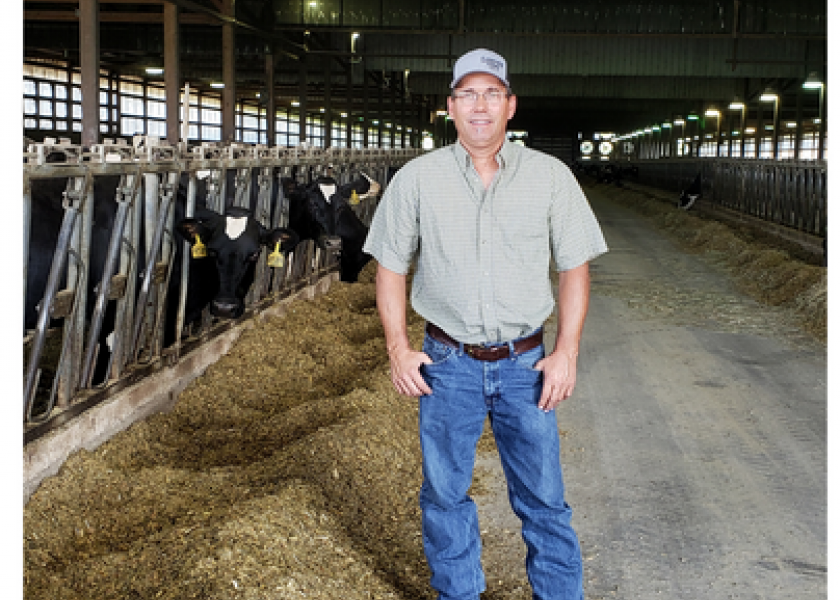Wisconsin Farmer Shares Climate Positive Tips For Producers, Trusted Advisers

A series of extreme rains prompted Wisconsin farmer Brad Clark to change the way he operates and begin integrating more regenerative practices. The transition began three years ago on the row-crop and dairy operation, which included his older brother, Brian, and younger brother, Bruce.
“We’d have 5” to 7” in an hour,” says Brad. The operation manages 1,000 dairy cows, 2,500 tillable acres and also raises dairy replacement cows.
They started collaborating with Adam Kramer, co-founder of Black Sand Granary, their certified crop consultant, and work together to support local farmers with services including custom seeding and support in converting to no-till and integrating cover crops.
Making Cover Crops Pay
In the near-term, Clark says, the biggest ROI from regenerative practices will come from using dairy manure on his farm’s fields.
“We added a small grain into our rotation so we could get early manure application on our ground,” Clark explains. “If needed, we can follow that manure application with fall direct-seeding of alfalfa into that or cover crops to carry through till the next spring.” In some cases, the cover crop—such as rye—can be harvested for forage for the cows.
On other parcels, the operation uses a 10-way mix of different covers including clover and sudan grass.
Environmental and economic benefits extend beyond cover crops. Converting to a no-till system has reduced fuel and labor costs by cutting equipment passes across the field, Clark notes.
Those benefits are especially important given the farm’s location smack dab next to the Mississippi River in the Driftless Area, a 24,000-square-mile region spanning four states.
“It’s rolling hill ground with ridgetops and pretty decent slopes,” Clark explains. “We also farm river-bottom ground. It’s kind of unique that way with different soil types including sand and black timber soil.”
The location presents opportunities and challenges. “It depends on the day,” Clark jokes. They have ready access to river and rail services, and they have plenty of fresh water for grazing throughout the summer. Yet the hills, bottoms and tapestry of soils make it important to steward natural resources well to keep local recreation areas clean for the public.
Regenerative Farming In Action
In the past several years, Clark and his operating partners have begun participating in a demonstration network that invites other farmers to see regenerative farming in action. He’s encouraged by the feedback he’s getting from members of his dairy peer group as he speaks publicly about his experiences. A peer recently told Clark they’d made a recent article about Clark’s operation mandatory reading on their farm operation.
For farmers curious about applying regenerative practices within their operations, Clark has some advice.
“Talk to someone that’s done it, and get a plan down in front of you that you can see yourself realizing from start to finish,” Clark says. “Keep an open mind. You’ve got to have willingness to change the old ways. Change is hard. And follow through. You’ve got to have follow through and commitment. Because there will be failures, but there will be successes, too. And hopefully Mother Nature gives you a little good karma, too.”
Trusted advisers supporting farmers on this journey can do their part by researching contact information for “everyone and anyone involved” in regenerative farming efforts, Clark adds. “They need to offer value-added programs or incentives. That would really get people on board—monetize it in some way,” he says.
Another item high on Clark’s wish list? “Campaign to make cover crops insurable,” Clark says. He notes that today, cover crops can’t be insured.
For now, Clark is willing to risk a loss on the covers because “they’re doing the work.”
He’s seen the benefits. He isn’t turning back.
Clark will participate in a free virtual event titled, “Can regenerative agriculture unlock the connection between food consumers and agricultural producers?” from 10 to 11 a.m. CT Nov. 17, 2021. Registration is now open for this America’s Conservation Ag Movement experience sponsored by Corteva Agriscience. Corteva recognized Clark earlier this year as one of nine winners of its Climate Positive Leaders Program.







